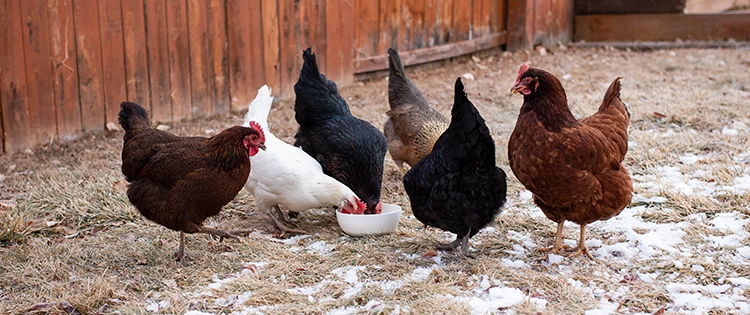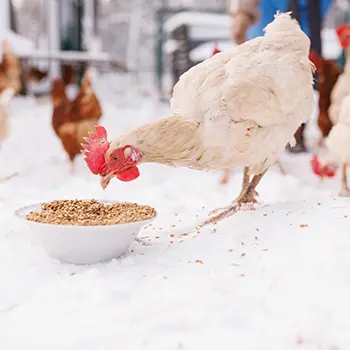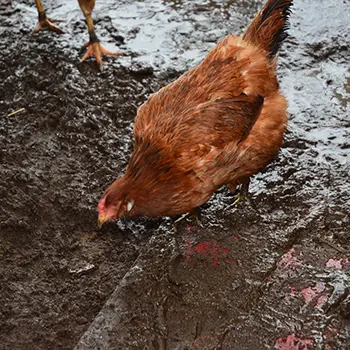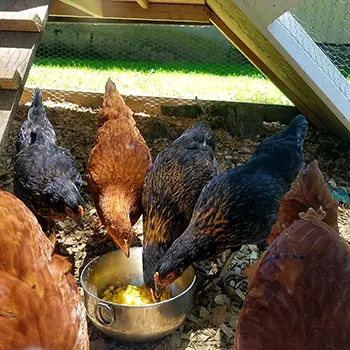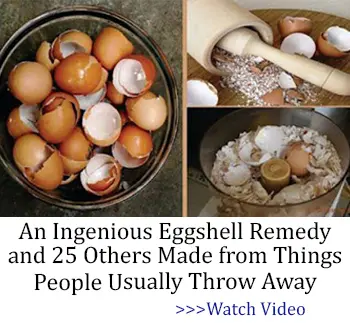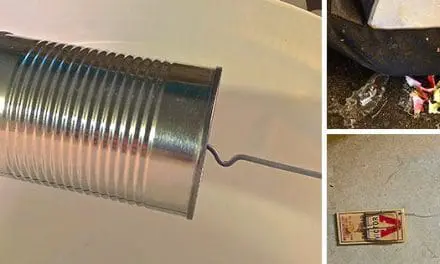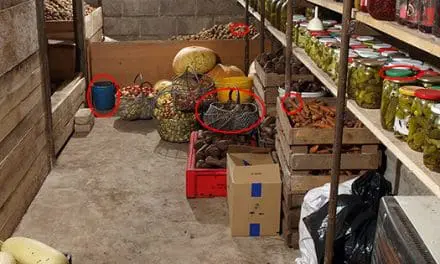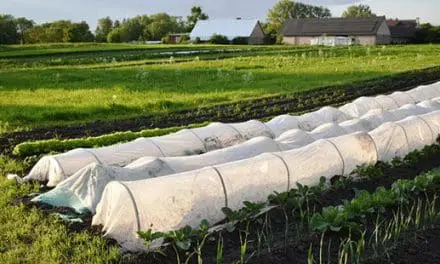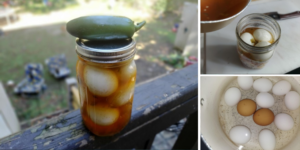Many first-time chicken keepers find themselves swooning over baby chicks during the spring, enjoying fresh eggs throughout the summer and fall but may find themselves at a loss when the leaves fall and the snow sneaks in. So how do I feed my chickens in winter and keep them healthy? Should they stay on layer feed or switch to something else?
Today, we’ll look at exactly what you should feed your chickens during the coldest time of the year based on what region you’re in and what type of chickens you have. Let’s get started.
What Should I Feed My Chickens In Winter – Far North
If you’re very far north and your birds are stuck trotting through snowy drifts and desperately seeking a bug or a bit of grain, you’ll have the toughest job ahead of you. Poultry often deals with cold weather pretty well if given significant bedding.
I recommend a deep litter method started months ago and topped with fresh straw once a week to keep things clean but toasty. You can add a light if you like, but remember that these lights are a fire hazard when all is said and done.
However, feeding can be a challenge. While you can keep your birds on layer feed, this won’t help them build up the fatty layer they need to remain warm and you may have some birds draw down on their body condition while this weather stays with you.
I recommend a high-fat, high-protein diet. Much like people used to when homes weren’t so thoroughly heated, these birds need to eat extra calories and dense calories to help them pack on the weight.
Bluntly? Gut-loaded insects and suet packs are wonderful additions to their usual meal of layer feed. You may also want to add something like a scratch grain for them to eat at their leisure, too.
Offering kitchen scraps such as vegetable trimmings, cooked rice, and leftover fruits can provide additional nutrition and variety to their diet. Just make sure not to feed them anything toxic to chickens, like avocado pits or onions.
What Should I Feed My Chickens In Winter – Southerly States
Rain, rain, and more rain. While you’ll see some chilly weather, it’s usually not snow drifts and frozen lakes level of cold. However, that doesn’t mean your birds can get by on simple layer food, either.
I usually recommend a flock raiser and feather conditioner food that has 18-22% protein and a minimal rise in fat. The birds won’t need a huge layer of fat to get them through the cold, but extra weight will be appreciated.
By adding a feather conditioner food to your flock, you help them grow a better “winter coat.” This is better than letting them molt and then have patchy feathers.
For those in very southern locations, you may even be getting eggs during this period. Go ahead and keep your calcium supplement handy for your girls. It won’t hurt them in the slightest even if they do stop laying.
Fluffy, Not Feathery Breeds
For breeds like Silkies, you’ll want to up their rations to the “northern” type feeding regardless of where you live.
Typical Silkies and other powder puff breeds may not react strongly to the cold. However, frizzle types and young Silkies will be sensitive to temperatures below 40°F.
Some Silkies might like the cold, but they often curl up in a ball. You can find them at the back of the nesting box, shivering. They look at you as if it’s your fault the weather is so chilly.
Planning ahead can prevent them from getting so cold. We don’t recommend bringing full-grown chickens into your home just because it’s cold. However, if temperatures drop below 20°F at night, be careful.
Silkies may need a warming-up station regardless of what you feed.
The same goes for any other breed in which the skin is not fully covered by flat, broad, typical feathers. Turkeys may also see frostbite and shivering issues if exposed to long periods of cold due to the naked patch on their neck.
Preparing for Sudden Cold Snaps
Perhaps you’re in Florida or another state that sees very mild (or non-existent winters. Suddenly, the weatherman is telling you that you’ll be seeing ice and snow very soon. What does that mean for your chickens? You don’t have weeks to build up fat or improve feathers. You need to stay warm during a sudden cold snap. Well, I live in this area so this is how I’ll feed my chickens in winter, like any other cold season.
This is a big problem for many chicken owners across the country. The changing weather makes it even harder. As I write this, it was 9F on Sunday morning. By Thursday it will be 77F. And temperatures like this, in either direction, can certainly wreak havoc on sensitive chickens.
After all, they are just birds. Birds get cold very quickly when they are used to higher temperatures.
Related: Why Are My Chickens Losing Feathers?
Our recommendation is two-fold: habitat/keeping and feeding. When I feed my chickens in winter, I keep them on their usual ration because sudden changes can cause diarrhea, leading to dehydration and making them colder.
Instead, I add warmth and mass to their diet. A heated water bowl or waterer keeps their water at body temperature. I also offer a hot mash twice daily—something as simple as oatmeal (plain rolled oats boiled in hot water and served sloppy in a pan) helps keep my birds fit and warm until the harsh weather passes.
The most important thing is to keep their routine as normal and comfortable as possible. When I feed my chickens in winter, I focus on keeping them warm from the inside without stressing them with sudden changes. Stress comes from unfamiliar situations, so winter isn’t the time for drastic shifts, even with good intentions.
Did we miss something? Do you have a suggestion for feeding your chickens during the winter? Comment down below; we’d love to hear about your experience with your flock and with the frosty time of the year. And, no matter what winter throws at you, Happy Homesteading!
You may also like:
The Only Plant That Will Make Your Poultry Lay More Eggs Than Usual (Video)
Livestock In Winter: Mistakes Even The Most Advanced Homesteaders Make

